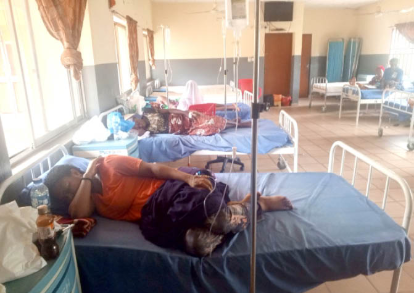
A worsening electricity crisis is severely disrupting healthcare delivery in hospitals across Nigeria, leaving patients and their families in distress and contributing to preventable deaths, a Daily Trust investigation has revealed. Hospitals nationwide are grappling with frequent power outages, forcing delays and cancellations of critical medical procedures, surgeries, and diagnostic tests.
At the Jummai Babangida Maternal and Neonatal General Hospital in Minna, Niger State, a woman died during fibroid surgery after the electricity supply failed and the backup generator could not be started due to lack of fuel. Her husband recounted that the operation, which should have lasted less than 90 minutes, stretched for hours as hospital staff scrambled to restore power, resorting at one point to using torchlights in the operating theatre. Relatives of other patients reported similar ordeals, including a case where a baby died in the womb after hours of waiting for a caesarean section that could not be performed due to lack of electricity and water.
In Kano, patients at Aminu Kano Teaching Hospital are forced to use rechargeable fans to cope with the heat during outages, while the hospital management struggles with monthly electricity bills of up to N100 million. The hospital has accumulated a debt of N700 million and recently doubled service charges in an attempt to keep up with costs. Plans are underway to install solar panels in critical areas, but many wards still lack reliable backup power.
Lagos State University Teaching Hospital (LASUTH) faces similar challenges. The hospital, now disconnected from the state’s Independent Power Project, rations grid electricity to 16 hours a day and relies on generators for the rest. This arrangement leaves some wards and outpatient clinics without power for hours at a stretch. Patients’ relatives say they have had to wait days for essential tests and treatments due to the erratic supply.
The situation is echoed in Abuja, where patients at the University of Abuja Teaching Hospital have been told to wait for the restoration of public power before undergoing x-rays, as the machines cannot run on generators. Similar complaints were reported at the National Hospital Abuja.
Healthcare experts warn that Nigeria’s inadequate power infrastructure is undermining the quality of medical services and putting lives at risk. They advocate for urgent investment in renewable energy, particularly solar power, to ensure uninterrupted electricity for health facilities. The federal government has launched a committee to explore sustainable electrification options for public hospitals, but progress remains slow.
Electricity distribution companies, meanwhile, insist that hospitals receive power according to their tariff band and payment, with no special consideration for healthcare institutions. As hospitals continue to struggle with mounting energy bills and unreliable supply, patients and their families bear the brunt of a crisis that shows no sign of immediate resolution.






